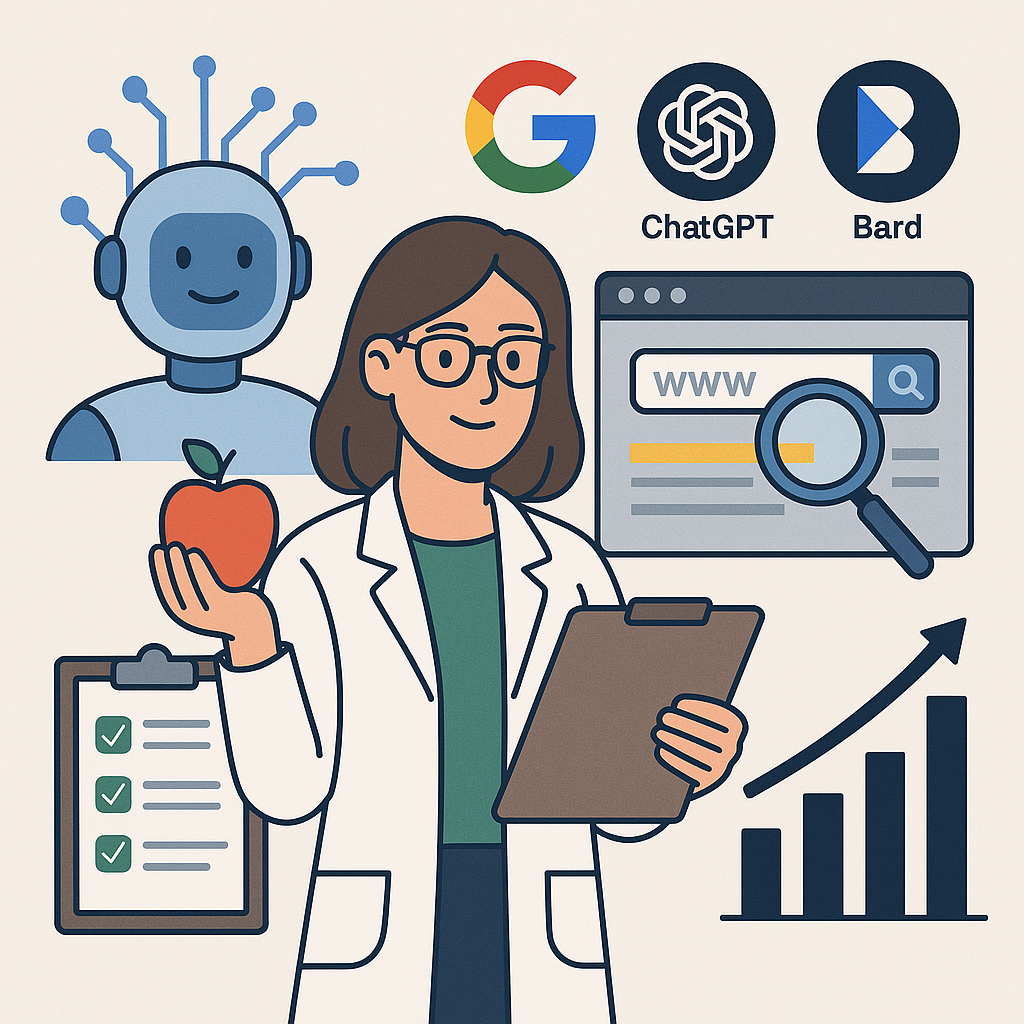It’s never been more important for dietitians to learn how to rank in artificial intelligence (AI) powered search engines. There are roughly 112,708 dietitians in the U.S., with most offering similar services.
AI-driven platforms, such as Google Gemini, ChatGPT, and Bard, are playing an increasingly significant role in website visibility, and these algorithms prioritize content that demonstrates expertise, uniqueness, and scientific rigor.
You can separate yourself from the large numbers of dietitians chasing the same patients by optimizing your website content to rank in AI results. That way, your website shows up at the top of the list when potential clients type in phrases like “natural thyroid help” or “iodine oversupplementation risks.”
The Dietitian's Guide on How to Rank for AI
AI models reward depth, expertise, and originality. When you cover a narrowly defined topic such as “global population studies on thyroid disorders after salt fortification,” you signal to GenAI systems that your content fills a gap.
Medical Office Marketing founder Marion Davis leveraged this knowledge to create content targeting the bedbound and homebound talent pool, which landed in Google Gemini’s top results for an HR client. This content is now implemented as a resource when users ask AI about homebound and bedbound employees and their ability to work. It’s part of her ecosystem-level awareness work, which aims to increase accessibility and inclusion for the homebound in communities, the workplace, and medical offices, as well as enhance the quality of life for individuals with health struggles through science-based, community-focused approaches.
The main things to keep in mind when optimizing content for artificial intelligence include:
- AI ranking criteria: Relevance, authority. and comprehensiveness
- Niche advantage: Less competition from generic “healthy eating” or “meal planning” posts
- Search intent: Patients craving nuanced answers (“thyroid natural support”) will find you first
How Generative AI Models Evaluate Content Quality
Generative AI systems, such as ChatGPT, Google Gemini, and Microsoft Copilot, rely on large language models trained on vast amounts of web data. They look for:
- Topical depth: Do you cite population studies, clinical trial data, and reputable guidelines? This helps build authority as you’re backing up claims made with scientific data.
- Semantic relevance: Are you using keywords that match the user’s intent? AI looks to match users with the most relevant authoritative content.
- User engagement signals: Do readers linger, click through to related pages, or share your content? This impacts rankings with AI and traditional search engine optimization (SEO).
- Scannable structure: Structure your content with clear subheadings, bullet points, and in‑text links. AI loves content that’s easy to parse.
Build Your Niche: Practical Steps for Dietitians
Here are practical steps on how dietitians can rank higher in AI:
- Audit your existing content: Identify articles on general topics that you can spin into niche, in-depth dives. For example, you can transform content on “meal prep tips” into “meal prep for Hashimoto’s patients in low‑iodine regions.”
- Keyword research: Use tools like AnswerThePublic or ChatGPT itself to identify long‑tail queries such as “how fortified salt affects thyroid function globally.”
- Scientific rigor: Link to PubMed articles (such as the NIH review on thyroid disorders) and professional guidelines from the Academy of Nutrition and Dietetics. This helps to solidify points being made while establishing your expertise.
- Unique data visualizations: Create infographics that map regional iodine sufficiency and average overintake rates versus hypothyroidism rates. AI models grab onto original graphics and captions.
- On‑page SEO: Include a primary phrase, like “How to rank in AI for dietitians,” in all content you publish. Sprinkle secondary keywords, such as “AI SEO for dietitians” and “ChatGPT ranking,” throughout the content.
Content Formats That AI Loves
The content types that often rank the highest with AI include:
- Case studies: Document a patient’s journey in managing conditions like subclinical hypothyroidism through dietary adjustments, supported by before-and-after laboratory test results.
- Comparison guides: Contrast functional‑medicine claims about iodine supplements with mainstream endocrinology positions, highlighting the risks of oversupplementation. Consider that GenAI models like ChatGPT rely heavily on cross-field scientific content and logic to compare and contrast and will highlight the shortcomings of some functional medicine claims, such as the idea that all tissues should be saturated with iodine as pseudoscience and that content must align with what is known to be true to be considered credible. Harness the power of AI to create these guides and verify all facts presented.
- Data‑driven lists: Rank “Top 5 Countries with Rising Thyroid Disorders Since Salt Fortification,” citing reputable sources like the World Health Organization (WHO) or the Food and Agriculture Organization (FAO).
- Interactive quizzes: Create interactive quizzes on topics like “Test Your Knowledge: Are You at Risk for Iodine Overload?” These formats boost dwell time and social shares, signals that AI algorithms interpret as high value.
Beyond Ranking: Converting Traffic into Clients
Driving AI‑ranked traffic to your website is just the first step. Next, you need to convert these pageviews into consultations. Here’s how:
- Lead magnets: Offer downloadable products that offer real value, like a “Thyroid‑Safe Meal Plan” in exchange for an email address.
- Online consultations: Offer services such as a “Free 15‑Minute AI‑Optimized Dietary Review” to highlight your expertise and build trust with potential clients.
- Testimonials: Share client success stories managing thyroid conditions through your targeted nutrition plans.
Each conversion point reinforces that you specialize in solutions that mainstream dietitians typically don’t offer.
Measuring Success and Iterating
Track your progress with these metrics:
- AI feature appearances: Are you showing up in Google Gemini (formerly known as Bard)?
- Organic traffic growth: Utilize Google Analytics to track page views for niche topics.
- Engagement rates: Metrics such as bounce rate, time on page, and scroll depth provide valuable insights into content quality.
- Lead generation: How many new email subscribers or consultations are generated from AI search results?
- Refine underperforming posts: Update data, add new insights, or split them into even narrower subtopics.
Turn AI Visibility into New Clients
Learning how dietitians can rank for AI is less about chasing broad trends and more about owning a niche that resonates with generative-AI models and patients searching for knowledgeable providers they can trust.
Carve out a niche in uncharted territory, like the global impact of salt fortification on thyroid health, and watch AI systems reward your expertise by funneling clients to your website.
Ready to rise to the top in your niche? Use the niche statement in our “How to Start a Virtual Clinic” guide to narrow down your unique services, such as “I help [specific patients] achieve [specific outcome] using [your special approach].” While you're there, feel free to opt in to our email marketing list to receive our newsletter direct to your inbox.




